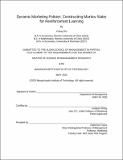Dynamic marketing policies : constructing Markov states for reinforcement learning
Author(s)
Zhu, Yuting(Scientist in business management)Massachusetts Institute of Technology.
Download1191221417-MIT.pdf (1.178Mb)
Alternative title
Constructing Markov states for reinforcement learning
Other Contributors
Massachusetts Institute of Technology. Department of Mechanical Engineering.
Advisor
Catherine Tucker.
Terms of use
Metadata
Show full item recordAbstract
Many firms want to target their customers with a sequence of marketing actions, rather than just a single action. We interpret sequential targeting problems as a Markov Decision Process (MDP), which can be solved using a range of Reinforcement Learning (RL) algorithms. MDPs require the construction of Markov state spaces. These state spaces summarize the current information about each customer in each time period, so that movements overtime between Markov states describe customers' dynamic paths. The Markov property requires that the states are"memoryless,"so that future outcomes depend only upon the current state, not upon earlier states. Even small breaches of this property can dramatically undermine the performance of RL algorithms.Yet most methods for designing states, such as grouping customers by the recency, frequency and monetary value of past transactions (RFM), are not guaranteed to yield Markov states. We propose a method for constructing Markov states from historical transaction data by adapting a method that has been proposed in the computer science literature. Rather than designing states in transaction space, we construct predictions over how customers will respond to a firm's marketing actions. We then design states using these predictions, grouping customers together if their predicted behavior is similar. To make this approach computationally tractable, we adapt the method to exploit a common feature of transaction data (sparsity). As a result, a problem that faces computational challenges in many settings, becomes more feasible in a marketing setting. The method is straightforward to implement, and the resulting states can be used in standard RL algorithms. We evaluate the method using a novelty a lidation approach. The findings confirm that the constructed states satisfy the Markov property, and are robust to the introduction of non-Markov distortions in the data.
Description
Thesis: Ph. D., Massachusetts Institute of Technology, Department of Mechanical Engineering, May, 2020 Cataloged from the official PDF of thesis. Includes bibliographical references (pages 65-67).
Date issued
2020Department
Massachusetts Institute of Technology. Department of Mechanical EngineeringPublisher
Massachusetts Institute of Technology
Keywords
Mechanical Engineering.